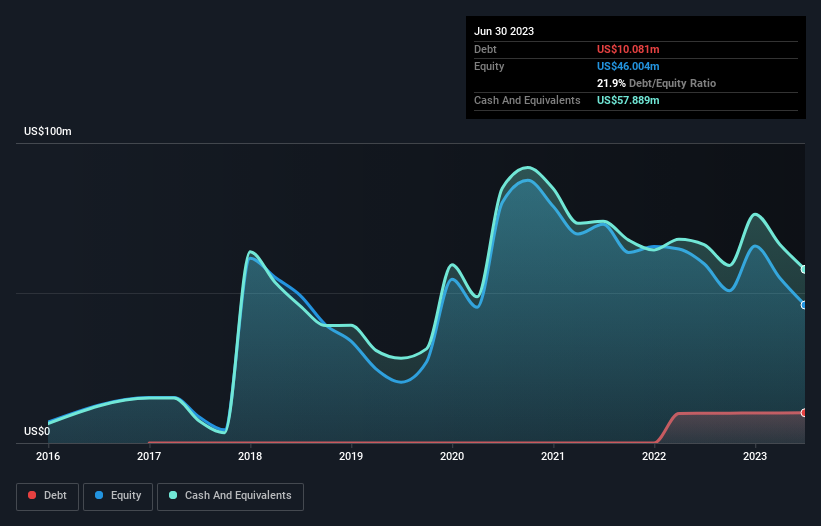
David Iben put it well when he said, 'Volatility is not a risk we care about. What we care about is avoiding the permanent loss of capital.' So it seems the smart money knows that debt - which is usually involved in bankruptcies - is a very important factor, when you assess how risky a company is. As with many other companies Cue Biopharma, Inc. (NASDAQ:CUE) makes use of debt. But should shareholders be worried about its use of debt?
Why Does Debt Bring Risk?
Debt assists a business until the business has trouble paying it off, either with new capital or with free cash flow. Part and parcel of capitalism is the process of 'creative destruction' where failed businesses are mercilessly liquidated by their bankers. However, a more usual (but still expensive) situation is where a company must dilute shareholders at a cheap share price simply to get debt under control. Having said that, the most common situation is where a company manages its debt reasonably well - and to its own advantage. When we examine debt levels, we first consider both cash and debt levels, together.
View our latest analysis for Cue Biopharma
What Is Cue Biopharma's Debt?
The chart below, which you can click on for greater detail, shows that Cue Biopharma had US$10.1m in debt in June 2023; about the same as the year before. But on the other hand it also has US$57.9m in cash, leading to a US$47.8m net cash position.

How Healthy Is Cue Biopharma's Balance Sheet?
We can see from the most recent balance sheet that Cue Biopharma had liabilities of US$16.3m falling due within a year, and liabilities of US$10.9m due beyond that. On the other hand, it had cash of US$57.9m and US$1.14m worth of receivables due within a year. So it can boast US$31.9m more liquid assets than total liabilities.
This surplus suggests that Cue Biopharma is using debt in a way that is appears to be both safe and conservative. Given it has easily adequate short term liquidity, we don't think it will have any issues with its lenders. Succinctly put, Cue Biopharma boasts net cash, so it's fair to say it does not have a heavy debt load! There's no doubt that we learn most about debt from the balance sheet. But ultimately the future profitability of the business will decide if Cue Biopharma can strengthen its balance sheet over time. So if you want to see what the professionals think, you might find this free report on analyst profit forecasts to be interesting.
Over 12 months, Cue Biopharma made a loss at the EBIT level, and saw its revenue drop to US$1.8m, which is a fall of 85%. To be frank that doesn't bode well.
So How Risky Is Cue Biopharma?
Statistically speaking companies that lose money are riskier than those that make money. And we do note that Cue Biopharma had an earnings before interest and tax (EBIT) loss, over the last year. Indeed, in that time it burnt through US$39m of cash and made a loss of US$52m. However, it has net cash of US$47.8m, so it has a bit of time before it will need more capital. Even though its balance sheet seems sufficiently liquid, debt always makes us a little nervous if a company doesn't produce free cash flow regularly. The balance sheet is clearly the area to focus on when you are analysing debt. However, not all investment risk resides within the balance sheet - far from it. For instance, we've identified 4 warning signs for Cue Biopharma (1 is a bit unpleasant) you should be aware of.
If you're interested in investing in businesses that can grow profits without the burden of debt, then check out this free list of growing businesses that have net cash on the balance sheet.
New: AI Stock Screener & Alerts
Our new AI Stock Screener scans the market every day to uncover opportunities.
• Dividend Powerhouses (3%+ Yield)
• Undervalued Small Caps with Insider Buying
• High growth Tech and AI Companies
Or build your own from over 50 metrics.
Have feedback on this article? Concerned about the content? Get in touch with us directly. Alternatively, email editorial-team (at) simplywallst.com.
This article by Simply Wall St is general in nature. We provide commentary based on historical data and analyst forecasts only using an unbiased methodology and our articles are not intended to be financial advice. It does not constitute a recommendation to buy or sell any stock, and does not take account of your objectives, or your financial situation. We aim to bring you long-term focused analysis driven by fundamental data. Note that our analysis may not factor in the latest price-sensitive company announcements or qualitative material. Simply Wall St has no position in any stocks mentioned.
About NasdaqCM:CUE
Cue Biopharma
A clinical-stage biopharmaceutical company, develops a novel class of injectable therapeutics to selectively engage and modulate targeted, disease relevant T cells directly within the patient’s body.
Medium-low with mediocre balance sheet.
Market Insights
Community Narratives




